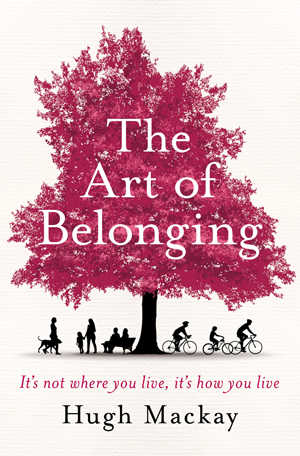
DARREN CRONSHAW reads Hugh Mackay’s The Art of Belonging…
Hugh Mackay,
The Art of Belonging: It’s not where you live, it’s how you live
Macmillan, Sydney, 2013
ISBN: 978-1743538920

“As a pastor eager to belong locally and passionate to cultivate belonging for others, I found Mackay once again helped me put my finger on the pulse of longings and desires of everyday Australians who our church seeks to serve. ‘The art of belonging’ and the message ‘It’s not where you live, it’s how you live’ ought to be central to all out churches.
How do we live and cooperate well as individuals in community? The Art of Belonging examines how people grapple with tensions between independence and interdependence. With a playful mix of social analysis and creative writing, social commentator Hugh Mackay describes the experience of life in Australian suburbs drawing on interviews with thousands of Australians, and narrates the everyday experiences of fictitious but believable Southwood.
Readers will resonate with different aspects of Southwood’s neighbourhood support and squabbles, working and volunteering, romances and affairs, meals and working bees, generational and cultural differences, family life and single living, and struggles with drugs and mental illness. The snapshots of neighbourhood life are inviting and intriguing. Mackay describes the social capital of schools and churches, cafes and libraries, sports clubs and volunteer associations, and even railway stations and hairdressers.
HOWHe does not gloss over the challenges and frailty in any community with the inevitable squabbles and competitiveness. There is a particular appeal not to see any group as merely a ‘burden’ on the neighbourhood, describing particularly the challenges of refugees, elderly, poor, mentally ill or post-school drifters. But the underlying message of the book is that the dream of a supportive, cohesive village experience is achievable – with its benefits of security and belonging – for anyone willing to put in the effort of participation and contribution.
Mackay asks the inviting questions: “Why does it so often take a crisis to bring us to our senses, to help us decide what’s important in life and clarify our sense of meaning and purpose?…Do we really require the trigger (or the threat) of pain, trauma or less to remind us that we are part of a larger whole; that communities can only support us if we let them; that disengagement is not an option if we are to fulfil our destiny as social creatures?
All communities will have differences of opinion and experiences of insensitivity or disappointment, but Mackay reminds us that the art of belonging is worth cultivating: “We are still social creatures by nature; that can’t be denied. We are still born to cooperate as well as compete, and we are not at our shining best when we retreat into the self-serving, arrogant (sometimes narcissistic) position of the outsider. There’s a place for us, somewhere, even among a loose affiliation of surly solipsists who want to deny their connection with anyone. It all depends on how you choose to make sense of your life. For most of us, life’s richest meanings spring from our personal relationships and connections. That’s why the desire to belong is a throbbing urge that won’t be stilled until our hearts find safe lodgings.”
This is a book and a message relevant for everyone who feels the urge that we can make better use of – or make a better contribution to – our local neighbourhood. As a pastor eager to belong locally and passionate to cultivate belonging for others, I found Mackay once again helped me put my finger on the pulse of longings and desires of everyday Australians who our church seeks to serve. “The art of belonging” and the message “It’s not where you live, it’s how you live” ought to be central to all out churches. The Southwood East Community Church pastor is an inspiring bloke too, and has wisdom and shadows to learn from alongside the host of other characters in this warm and well-written book.
This review was originally published in Crucible 7:2 (November 2016).





